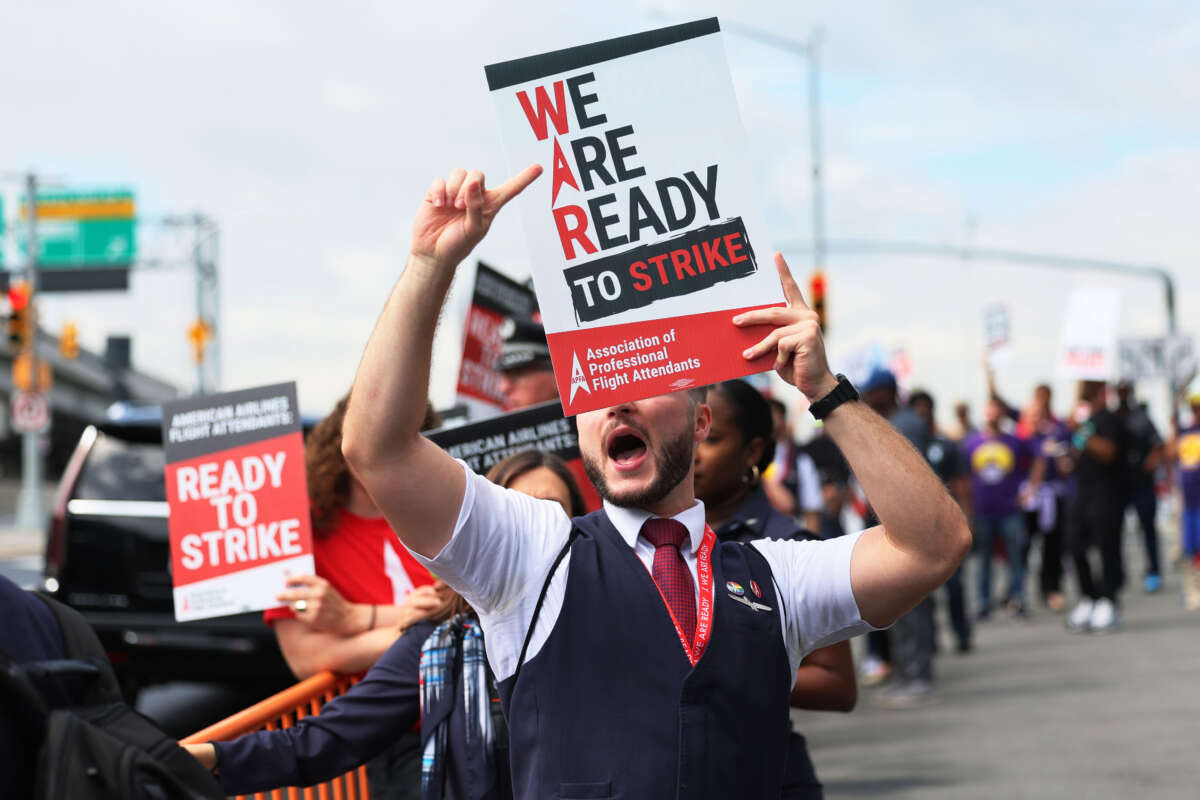Flight attendants for American Airlines overwhelmingly voted to authorize a strike on Wednesday as contract bargaining has stalled after years of negotiations and workers have gone through the pandemic without getting a raise.
According to the union, the Association of Professional Flight Attendants (APFA), 99.5 percent of flight attendants who participated in the months-long vote approved the strike, with 93 percent of eligible workers casting a vote.
“Today, we sent a clear message to American Airlines management: We are fired up and ready for a contract. They ignore this strike vote at their peril,” APFA National President Julie Hedrick said in a statement. “Our contributions to the success of American Airlines must be recognized and respected.”
Over 26,000 workers would participate if the strike were to move forward. However, airline unions must clear several hurdles before workers are allowed to go on strike, including a 30-day cool-off period and approval from the federal board that oversees labor disputes in the rail and airline industries.
This means that the strike isn’t quite imminent, but possible — and the result of the vote demonstrates workers’ frustration with ongoing negotiations. Workers are waging informational pickets across 12 flight attendant bases this week.
American Airlines flight attendants haven’t gotten a raise since their contract became amendable in 2019. The union has demanded a 35 percent pay increase to make up for years’ worth of what amounts to pay cuts, as well as a 6 percent annual increase into the future. They are also seeking better benefits.
“Flight Attendants are ready for an agreement that respects our contributions to the success of this carrier,” Hedrick said last month when the APFA board approved a strike authorization vote. “Our contract became amendable in 2019, and American’s Flight Attendants have not received cost-of-living increases or any other quality-of-life improvements, even as they played an essential part in keeping American in the skies both during and after the pandemic.”
Flight attendants have been highlighting the abusive conditions they face on the job, including the fact that they aren’t paid when the plane door isn’t closed — meaning that during boarding, weather delays or between flights, flight attendants aren’t being paid. One flight attendant likened it to being at work for 12 or 13 hours, but only being paid for five hours of that time.
Labor leaders celebrated the vote. “Hell yeah, APFA! 99.5% strike vote! Let’s go!” wrote Association of Flight Attendants-CWA President Sara Nelson on social media. “Proud to walk with you today! … Flight Attendants across the industry are ready to do what it takes to get the contracts we deserve!”
American Airlines pilots recently won a contract after authorizing a strike earlier this year. In the spring, American Airlines pilots with the Allied Pilots Association voted to strike, with 96 percent of membership voting and 99 percent of votes in favor of striking.
Because pilots are also beholden to federal regulations regarding their striking rights, they never actually walked off the job. But the strike vote still yielded big wins for the pilots, who approved a contract earlier this month with 46 percent pay raises by 2027, immediate pay raises of over 21 percent, and $1.1 billion in immediate payments and ratification bonuses.
Meanwhile, the flight carrier has been enjoying high profits. In the second quarter of 2023, the company reported profits of $1.34 billion, with revenue rising to a quarterly record for the company of $14 billion.
Media that fights fascism
Truthout is funded almost entirely by readers — that’s why we can speak truth to power and cut against the mainstream narrative. But independent journalists at Truthout face mounting political repression under Trump.
We rely on your support to survive McCarthyist censorship. Please make a tax-deductible one-time or monthly donation.
